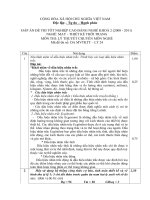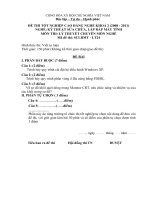PASSAGE 24
Bạn đang xem bản rút gọn của tài liệu. Xem và tải ngay bản đầy đủ của tài liệu tại đây (30.92 KB, 1 trang )
PASSAGE 24
INTERNATIONAL GIFT – GIVING CUSTOMS
The tradition of gift giving is a worldwide practice that is said to have been around since the beginning
of human beings. Over time different cultures have developed their own gift giving customs and
traditions.
In France the gift of wine for the hostess of a dinner party is not an appropriate gift as the hostess
would prefer to choose the vintage for the night. In Sweden, a bottle of wine or flowers are an appropriate
gift for the hostess. In Vietnam, a gift of whisky is appropriate for the host, and some fruit or small gifts
for the hostess, children or elders of the home. Besides, gifts should never be wrapped in black paper
because this color is unlucky and associated with funerals in this country. Gifts that symbolize cutting
such as scissors, knives and other sharp objects should be avoided because they mean the cutting of the
relationship. Also, in some countries you should not open the gift in front of the giver and in others it
would be an insult if you did not open the gift.
Beyond the gift itself, give careful consideration to the manner in which it is presented. Different
culture have different customs regarding how a gift should be offered – using only your right hand or
using both hand, for example. Others have strong traditions related to the appropriate way to accept a gift.
In Singapore, for instance, it is the standard to graciously refuse a gift several times before finally
accepting it. The recipient would never unwrap a gift in front of the giver for fear of appearing greedy.
Understanding these traditions and customs, as well as taking time to choose an appropriate gift, will help
you to avoid any awkwardness or embarrassment as you seek to build a better cross – cultural
relationship.
(Adapted from: />Question 1. When did the tradition of gift-giving become popular all over the world?
A. A long time ago
B. Thousands of years ago
C. Since the beginning of humans
D. Since the beginning of industrialization
Question 2. Which of the following is NOT true about gift-giving customs?
A. In France, wine is not considered a suitable gift for the hostess of a dinner party.
B. In Sweden, it is not customary to bring some wine or flowers when you are invited to a dinner party.
C. In Vietnam, such things as scissors, knives and other sharp objects shouldn’t be used as a gift.
D. In Singapore, it is unacceptable to open the gift right in front of the giver.
Question 3. The phrase “associated with” is closet in meaning to _________.
A. connected with
B. familiar with
C. informed of
D. similar to
Question 4. The word “it” in paragraph 3 refer to _________.
A. consideration
B. manner
C. gift
D. culture
Question 5. Which of the following is the main idea of paragraph?
A. The people who are presented with gifts
B. The traditions of giving and receiving gifts
C. The occasions of giving and receiving gifts
D. The manners of giving and receiving gifts
ĐÁP ÁN
1-C
2-B
3-A
4-C
5-D
Page 1









